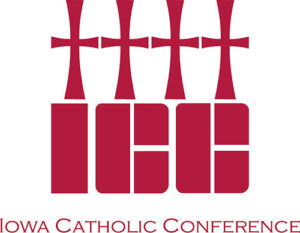 By Tom Chapman
By Tom Chapman
For The Catholic Messenger

This week features a flurry of activity at the State Capitol as the first “funnel” deadline hits. Bills must pass their first committee by Friday (Feb. 16) to receive further consideration. It is a way for legislators to manage their workload. The deadline does not apply to budget or tax-related bills. Some failed bills may return as amendments.
The Iowa Catholic Conference (ICC) still has several issues in play. The ICC opposes SF 2211, a bill to create a state crime of illegal entry into the state by an alien. The bill passed a subcommittee last week and is eligible for consideration by the full Senate Judiciary Committee.
State immigration policy already is pre-empted by the U.S. Constitution and federal law. We believe it is problematic that SF 2211 would allow for the prosecution of an individual for state immigration crimes even if that person’s application for immigration relief were pending before federal authorities. We are concerned about reinforcing the idea that certain people are a threat simply because they are present here.
A bill to bring back the death penalty, SSB 3085, could still be voted on by the Senate Judiciary Committee as well. While the death penalty is popular in some circles, the Church teaches in the Catechism that “the death penalty is inadmissible because it is an attack on the inviolability and dignity of the person, and she works with determination for its abolition worldwide.”
So far, the House Judiciary Committee has not debated the “smuggling of persons” bill, HF 2112. The Church does not encourage illegal immigration but is concerned that some people could interpret the bill, as drafted, to criminalize providing basic charity to immigrants.
The ICC is asking the House Judiciary Committee to pass HSB 621, a bill providing that an unborn person would be protected by Iowa criminal laws prohibiting murder, manslaughter, negligent homicide, etc. Any actions by the pregnant women are excluded from the bill. Forty other states already have these protections for unborn children.
A subcommittee planned to address (at press time) HF 488, regarding so-called “ghost guns.” The ICC supports the bill, which requires firearms parts that can be assembled to have a serial number. Iowa law does not regulate them because this type of technology did not exist until recently. Ghost guns apparently are gaining popularity for the mere fact that they are untraceable.
Last week at the State Capitol
Two bills that the ICC supports passed the Senate Health and Human Services Committee. SF 2252 is the fix for the Iowa MOMS (More Options for Maternal Support) program, and SF 2251 would require that mothers with Medicaid coverage would receive care for a full year after the birth of their child. Currently mothers have coverage for 60 days after the birth. The bill scales back the eligibility for mothers on Medicaid from 375% of the federal poverty level (the best in the country) to 215%. We are working to keep the existing eligibility rate. The House version, HSB 643, passed a subcommittee.
The House Judiciary Committee passed the Religious Freedom Restoration Act (RFRA) bill. HSB 614 creates a “compelling interest test” in cases where religious exercise is burdened by government action. Government should be held to a high level of proof before it interferes with someone’s free exercise of religion. A Senate committee has also passed an RFRA bill.
SF 2286, the “Med Act” medical conscience bill, passed the Senate Judiciary Committee. This bill provides needed conscience protections for medical personnel.
The ICC is monitoring HSB 653 and SSB 3146, the governor’s proposals to revamp Iowa’s behavioral health system. A House subcommittee passed HSB 653 and the Senate is beginning its consideration of the bill this week. This transition has been in the works for the past few years. The reaction from groups was generally positive, with some concerns mentioned about funding levels, inpatient care and issues with transitioning disability services into the aging department. The current regional mental health regional system was created about 10 years ago from a county-based system.
Finally, a bill to provide additional state resources for refugee resettlement was introduced as HF 2336. The legislation has been referred to the Appropriations Committee so it is eligible the rest of the session.
Federal immigration legislation
Congress is being urged to reject harmful changes to federal immigration law as a condition for supplemental funding. Over the past several months, a handful of senators have negotiated behind closed doors to reach an agreement on potential changes to U.S. immigration law.
In a Feb. 6 letter to Senate leadership, Bishop Mark Seitz, chairman of the U.S. Conference of Catholic Bishops’ (USCCB) Committee on Migration, expressed no position on the overall measure but stated that “this effort to make sweeping changes to immigration law — particularly in the context of this supplemental funding bill — is flawed, both in terms of substance and form. Rather than sustainably reducing migration to the U.S.-Mexico border, consistent with the common good and the good-faith intentions of many lawmakers, several changes proposed in this bill would unjustly undermine due process and pave the way for avoidable and potentially life-threatening harm to be inflicted on vulnerable persons seeking humanitarian protection in the United States.”
At the same time, the USCCB has expressed support for several aspects of the bill.
(Tom Chapman is executive director of the Iowa Catholic Conference.)











